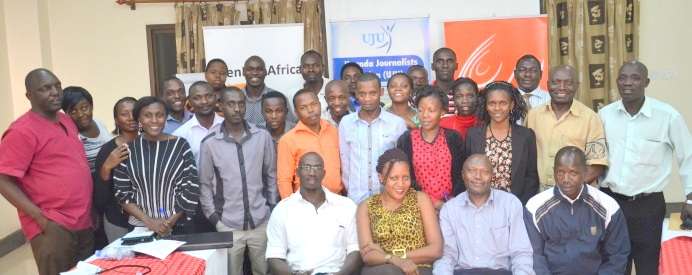By Juliet Nanfuka |
On May 2, a total of 27 Ugandan journalists were trained in digital security procedures. The training was held in commemoration of World Press Freedom Day (May 3), which this year was celebrated under the theme “Let Journalism Thrive! Towards Better Reporting, Gender Equality, and Media Safety in the Digital Age”.
The training, which was organised by the Collaboration on International ICT Policy in East and Southern Africa (CIPESA) in partnership with Uganda Journalists Union (UJU) and the East and Horn of Africa Human Rights Defenders Project (EHARDP), explored the status of journalism in Uganda as well as the legal and regulatory frameworks affecting freedom of expression in the country. Participants at the training workshop represented print, online and broadcast media houses from across Uganda.
During the training, it emerged that some journalists are not cautious about their online security, similar to those in a previous training hosted by CIPESA. The reuse of one password across different websites and platforms, and overexposure of personal information online were common among the training participants. Email encryption, the use of Virtual private networks (VPNs) and Multi Factor Authentication for passwords, were taught as skills that can aid journalists when investigating sensitive stories that may be prone to surveillance.
Norman Katende, an international award winning journalist, shared his experiences of being threatened while reporting on controversial stories and encouraged journalists to practice caution both online and offline. He questioned how journalism can thrive in the face of police attacks on the media, noting that journalists should not compromise on their security when covering sensitive stories just to earn a living.
According to the Committee to Protect Journalists (CPJ), an international organisation that defends the rights of journalists, over the past two decades, 1125 journalists across the world lost their lives while reporting or investigating stories. The medium increasingly used by journalists to source and disseminate information is the internet.
Last month, Somalia journalist Daud Ali Omar and his wife were murdered. The same month, Kenyan journalist Johan Kituyi, proprietor of the newspaper Mirror Weekly, which has covered controversial national issues, was also murdered.
Increasingly, online publishers and bloggers are also coming under attack in Africa. For instance, a year after their arrest, the Ethiopian Zone9 bloggers remain behind bars and in Burundi, civil unrest related to upcoming elections has led to government restrictions of information flow through various media houses – and radio stations.
Such attacks necessitate digital safety skills for journalists. “When you look at the level of knowledge on ICT that a journalist has – it’s really basic. We have several unsecured email accounts and we visit any website without [considering] security,” noted a journalist at the training in Kampala.
Journalists noted that they do not always exercise their rights and do not request security from their media houses when pursuing sensitive stories. They also indicated a lack of awareness of the laws in place that can aid them in developing stories, such as the Access to Information Act (2005), which compels Ministries, Departments and Agencies to release information.
Following a CIPESA presentation on the legal and regulatory frameworks affecting internet freedom, especially freedom of expression online in Uganda, a Soroti-based journalist said the training had made him re-evaluate how he used his mobile phone and the internet, saying that he had been using these tools “without considering their implications.”
Further to the commemoration of World Press Freedom day, CIPESA participated in the “Digital safety for journalists” plenary session of the global event hosted by UNESCO. CIPESA and its partners in various countries were also involved in a series of Twitter engagements which explored press freedom, including in the digital world, particularly for African journalists.
The training was conducted in the context of CIPESA’s OpenNet Africa initiative that promotes internet freedom in Africa and is supported by the Open Technology Fund, Hivos and the Association for Progressive Communications (APC).

